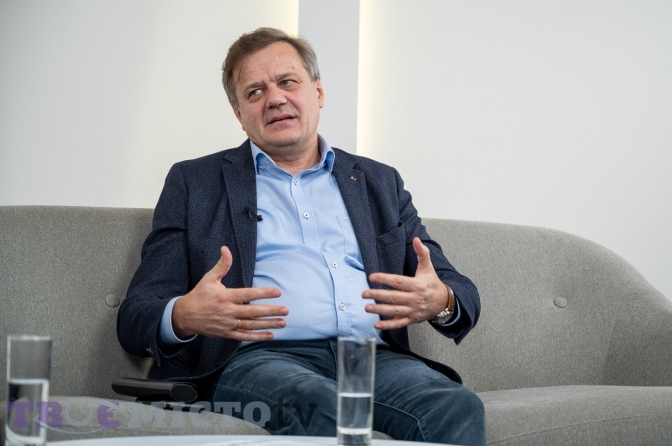
[For urgent updates please follow Ukrainian Freedom News on Telegram]
At the initial stage of the invasion, there were many attempts to explain Putin’s psychology. Some believe he is crazy, others assume that he is only pretending, and some – that he is completely rational and calculates every step. Whose side is the truth?
This is a complicated question. The first difficulty is that I have to speak not the way I would do at a medical council, but in public. The second is that we are dealing with something that can have different explanations, and there are different visions.
Putin is not hallucinating, though his thoughts are very often irrational, and he lives in a world of his invented history. On the one hand, he fools us with it, on the other hand – this is what he himself believes in. I have already described the dynamics because it is easier to write than to say. But, to put it succinctly, we are dealing with a psychopath.
When he is doing well, he has «beat everyone», he is on a white horse, he is on top. But when something is wrong – then we are dealing with a paranoid who has locked himself in a bunker, is afraid of a virus or poisoning, and is «blowing on the cold». It is a matter of the psyche, which works differently depending on the circumstances: if they’re bad, he is close to a psychotic existence, and if good – he is an antisocial psychopath who brags about his strength in front of others. This is a banal story.
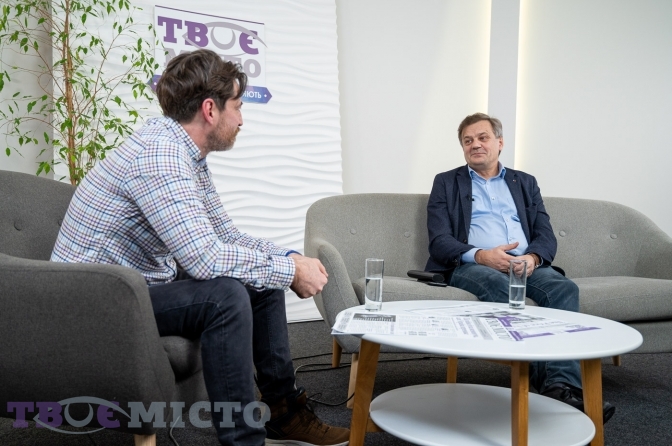
That is, can we say Putin is a paranoid psychopath?
Yes. Although I am not speaking in exact medical terms, rather metaphorically.
Recently, Zelenskyi said that if there was no Putin, the war would have ended. Scholz mentioned that he had to call Putin from time to time in order to understand whether he had enlightenment or whether it was possible to agree on something with him. Is it important for us to understand what is going on in Putin’s head?
It is better to understand your enemy. This is how we understand the motives, the way his head is arranged, and what needs to be done. We realize, for instance, that it’s not necessary to avoid confrontation, but rather to escalate it. The more we escalate it, the less adequate he is, the more mistakes he makes – and it’s better for us. If we understand how it is arranged, then we act better. Everything is simple.
What does this banality of Putin mean? Can we claim that he isn’t a completely reasonable person, not an intellectual, and not prone to reflection?
These are different questions. He has a fairly high intelligence, but he is poorly educated and knows little except communist stories and KGB moves. And that’s good for us. Also, he isn’t capable of self-observation.
Is there a chance that on this «swing» between the two states, he will come to a good decision, admit that he has reached a dead end, and that he cannot win this war?
He can say anything. This is a person who will lie, twist and never speak the truth, both to you and to himself. He will do anything to survive. And if this will be the only way out for him, then he will be a great peacemaker in general and will narrate that it wasn’t they who attacked, but NATO, the Nazis. That on his part, it was an attempt to fight for peace, and his advisers gave him bad advice. In a word, he will tell you many different stories, which you shouldn’t listen too much and pay much attention to them. We need to understand him, but not worry too much.
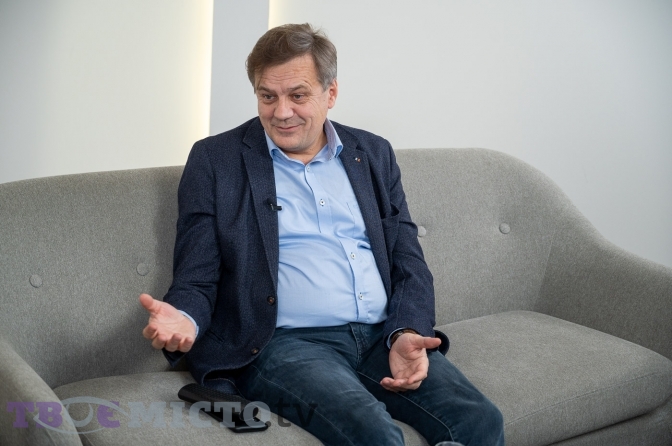
What if we talk about Russians in general? For a while, we were quite close...
Well, I don’t know – it depended on a person.
Of course, but in 1989-1990, we had similar voting results, value measurements. What is it now? Is it possible to make a collective diagnosis of an entire nation?
When we talk about nations, we do not use terms to indicate diagnoses, because we are not talking about diseases. It’s rather about something else: about prevailing myths, traumas, and the ways in which these myths describe traumas. If we compare Ukrainians, Finns, some African or Latin American countries and ask what people’s needs are, they will have the same needs. I have a cat, and he has the same needs as me: he wants to eat, to be warm, and to be loved. But when we talk about values and myths, there is a radical difference between us.
Russians are an imperial people who need pride in their «state». And we should have dignity. There is a big difference between pride and dignity. A worthy person is self-directed: «I must be worthy in my behavior, assessment, the way I think and do.» And if I have to be proud, it would only be due to the fact that ours defeated others, that I have a better president, and he «beat everyone», that we have a great empire. These are different myths and values. We are a rather chaotic, anarchic, horizontally organized community. They are a vertically organized hierarchical structure. And this is where we differ radically.
I still have the following question: did we have sociologists in 1990, did they read anything other than a short course on the Communist Party, did they know what they compared at all?
When a «good Russian» says he no longer feels connected to the empire, does he actually remain «Russian»?
You know, it’s not my question. I don’t care what «good or bad Russians» there are [Laughs]. I don’t have to think whether there are good or bad Finns, Mongols... We all have to think about ourselves, who we are, what is best for us.
Are there «haroshie russkie» (good Russians)? Let’s see what they will do. If it’s something positive, then they would be good. But until they do it, they won’t be called good. The further we are from thinking about «good and bad Russians», the better. We need useful «Russians» against harmful ones. We will find out after the war whether there are good ones among them, because until it’s over – there are none.
And what to do with newly converted Ukrainians? Recently, [Ukrainian pop singer] Nadia Dorofeeva published a post in Ukrainian on Instagram that she used to be childish and doesn’t want any cooperation with the Russians now.
You should love such people and welcome them. If I said that I was always right in my life, it would be ridiculous. We all make mistakes. If such people say they were wrong, and now they understand it, then we should be happy, because these are our fellow citizens, we will have to build a state together.
In such a case, how do you know whether they are sincere?
Listen, I’m not a confessor. A person says something, I look at what he does, and that’s enough. And if he cheats, we will see...
In general, are Ukrainians infantile as a nation?
All nations, large communities are infantile, because when there are many of us, even at a stadium or a concert, we are quite naive. Not naivety is determined by how well-structured the country is, or whether there are specialized working groups. The British psychoanalyst Wilfred Bion said that society should function through working groups, that is – through doctors, teachers, priests, journalists, and the military. And if everyone does their job well, interacts with others – then this group functions well.
In general, all nations are naive. Just look at the Americans who stormed the Capitol in hats with horns. It is part of their culture. Moreover, eight of the top ten universities in the world are located in the USA. That is, every nation has these naive sides, and so do we.

Is the number of sober-minded people critically necessary, regarding the same voters?
Yes, someone has to think. Ford said that he does the hardest work in his corporation: he thinks. And, obviously, there must also be a tradition of delegating certain functions. Those who are better informed, more educated, should have a greater voice. Although... modern media has levelled everything. You say that this singer has millions of listeners, so maybe she is more influential than any intellectuals?
This is the crisis of democracy – it cannot master new technologies. Because of this, we have different processes in the world, the victory of populism. It’s because people do not distinguish between specialization, expertise, and the meaning of a word. You know, they say that God created man, and Colt equalized people in rights. That’s how Facebook equalized people in terms of rights, maybe not always in a good way.
Should there be any reasonable limits? Does humanity know such things?
No, I don’t think there should be any restrictions. This is a question for the elites, who must learn, study new circumstances, technologies, and act based on new realities. It’s just that if they don’t, there is a natural change of elites.
Ukrainians have been facing the issue of elites since 1990. Are they being born now, and how can they be brought to power after the war?
I think they have already arrived. For the first 20 years, I had the feeling that I was much smarter than the people who lead us [Laughs]. Now, I don’t think this way. And it’s not even about the presidents. Since the time of Poroshenko’s government, many thinking, educated, and adequate people have come. The current government seems to be completely opposite politically, but that is not the point. Many people studied abroad, know languages, are aware of how this world is organized. We are making a lot of new things in IT technologies and transport.
I think we have already formed a class of elites. But back to your question, the lack of elites in 1990 was one of the reasons we failed. There is even one more – the West’s unpreparedness, reluctance to integrate us into the Western world, to conflict with Russia because of us. This is actually the same reason but from different sides. For 30 years, we had the following problem: Ukrainian elites longed for the West, and the West was closing its doors. In this case, any political project built on such principles is doomed to failure. Because if you lead where the door is closed, the people who follow you will sooner or later say that you are leading them in the wrong direction. Today we have overcome this neurosis, this stone of Sisyphus, which was pushed up the mountain.
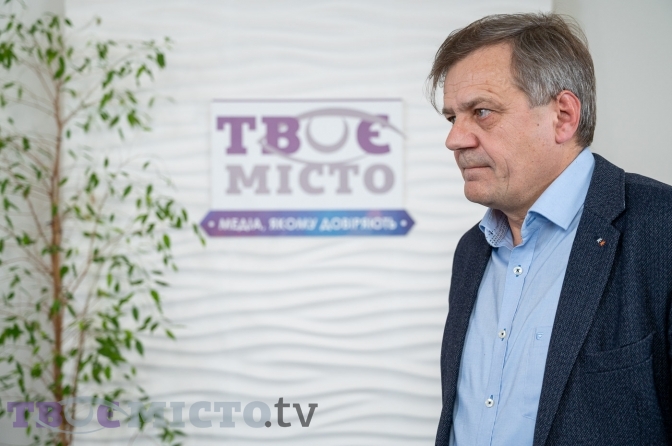
But at the beginning of independence, Anders Öslund said that he was surprised by the people in our government. Because, apart from Pynzenyk, the government officials did not understand the laws of the market. Maybe the elites were not ready?
Pynzenyk could not hold his own in the government, because the path he was leading us on ended with closed doors. Even before Oslund’s arrival in Kyiv, Bush Sr. came and said that «you should be in the empire with the great Gorbachev. I spoke with him recently, and he will tell you that your future is in the renewed Union.» That is, Pynzenyk’s «crisis» is connected with a closed door of the West.
It’s no secret that Ukrainians are regionally very different. Will this war «mix» them? Maybe this is not necessary?
There are no monolithic nations. Go, for example, to Germany, or Italy, and you will see huge regional differences. We have some very idealized image of it. As in Taras Shevchenko’s poem «And on the renewed earth...», we understand metaphor too literally.
This war will change us, it has already changed us. But these changes will not be as radical as we think. When the war ends, politics, which is absent now, will come to the fore again, and Ukrainians will once again argue and compete with each other. But I don’t see anything wrong with that.
Will we come to some shared markers, such as language?
With language – not today and not tomorrow, but in the perspective of one or two generations – it is quite possible. We have already come a long way, but if we want to reach our destination, we must not rush, because this is a steeplechase, not a sprint distance. And the one who wants to run a marathon should not run at the pace of a hundred meters. It should be done so that everyone has time. However, we are moving in the right direction.
Will there be regional differences? Of course. We even have a different climate, natural areas, architecture, history, and traditions. But we have already taken place as Ukrainians, we had to respond in Kherson, Kharkiv, near Luhansk, respond to the question of who we are – Ukrainians or Russians. And we have already answered it.
Do you believe in the Galician project of Ukraine as such? Was its existence not an exaggeration?
A long time ago, Orest Drul and I wrote an article about this. A lot has changed since then. Ukraine consists of many projects: there are Galicia, Volyn, Kyiv, Kharkiv, Odesa… Each regional community has its own idea of who we are. Obviously, these ideas, thoughts, and ideologies compete with each other. It is obvious that Galicia played its role. We were traumatized by the Russian Empire and therefore, we are unambiguous, often too radical, and demanding. Although this demandingness had the opposite results. But in general, we coped with our role and mission. Perhaps now, we will have to rethink it, because the situation has changed, and we have other tasks. We need not only to compete in the projects of the future, but also to negotiate. We should not only preach, but also learn to listen. Although I think we have done a lot of good.
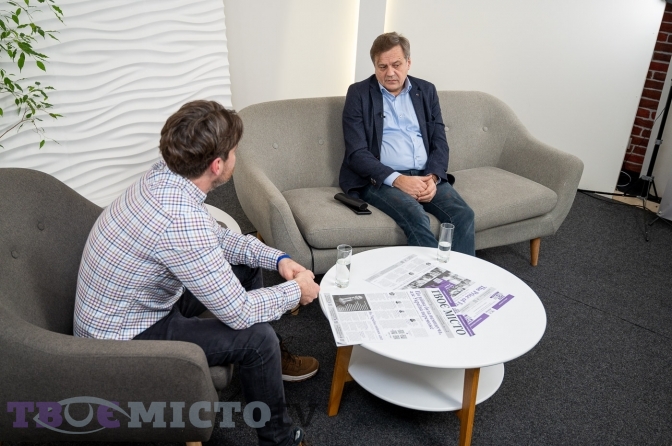
Regarding the post-war perspective: can Ukraine become a small «piece» of Russia or something similar to it?
I look at it from a different angle. This war is not even for independence – it is existential, for the right to exist. If Ukraine loses this war, it will disappear in the «Russian world». As an ethnic group, we may remain, but as a political nation, we will simply be destroyed. Or we will exist as part of the Western world, which has rules, procedures, and is still liberal-democratic. In this world, we will have a lot of external safeguards, and we will be forced to behave in a civilized manner. On the other hand, thanks to our natural anarchy, even outside the Western world, we have not become an authoritarian country.
We will have a million other dangers. There is a huge migration, and the country needs to be rebuilt. We need millions of workers, workers who will come from other countries. We face enormous tasks: how to meet them with dignity, not to allow our identity to dissolve; how to preserve their rights, but also accustom them to our rules; how to compete and cooperate with other countries. Now risks are everywhere, civilization is on the edge. We have acquired such technological and military capabilities that can destroy us. And when we get rid of the «Russians», we will face other «adult» threats – environmental, cultural, and economic issues. There will be no paradise...
Our guests answer the question about the future of Ukraine in radically different ways. How do you see it?
It depends on how the war ends, and what you mean by victory. By victory, I understand the unification of the eastern borders of the Western world and Ukraine. That is, Ukraine’s eastern border should become the border of the Western world, and we should become the eastern outpost of this world. This is how I understand our victory. Then we must be a military, democratic, high-tech country, maybe like Israel. It seems to me that in order to survive, we must modernize, and this is very difficult. We need not only to defeat the «Russians», but also to change a lot, because there are still «11 feats» in front of us, and we need to accomplish them, we still need to ponder a lot of things. I do not know how we will pass them, because I do not know the future. My profession is such that my head is directed to the analysis of the past.
What should we do with Russian culture: reject, ban or, as they say now, cancel it?
A few words about what Russian culture is. This is the result of the work of two centuries: from Peter I to Nicholas II. The first opened the «gate to Europe», invited many Europeans to Russia who spoke German, French, and Dutch – various languages. They and their descendants created a thin cultural layer in Russia and «the Great Russian culture». In 1917, they were all simply thrown out because of the socialist revolution, except among other things, it was also an exorcism: the devil was expelled from the Russian Orthodox soul in the form of the Western elite [Laughs]. All «Tolstoy and Dostoevsky» are descendants of cultured Western people. They, along with the White Guards [monarchist army, one of the sides in the Russian civil war] and bourgeois types of people, were thrown out. And from that moment on, Russia is struggling with the phantom of Western influence. Modern «Russians» have the same relationship to that culture as the Taliban have to the Buddhist monuments in Afghanistan. In the West, these two concepts are also poorly distinguished. For them, Tolstoy and Dostoyevsky are part of Western culture. And so it is, it’s just that modern «Russians» have nothing to do with them.
When the war is over, everything will calm down, the emotions will subside, and we will be able to distinguish better, many different colours will appear between black and white. I have never been a fan of Russian culture, but I do not think that it should be cancelled. You just need to clearly distinguish the imperial component. And one more thing: in order to create your own music, there must be silence behind the wall. We should, at least for a generation, build a kind of cultural wall, complete the building of our own culture, more oriented towards the West. Then it is no longer us, but our children who can continue this discussion.
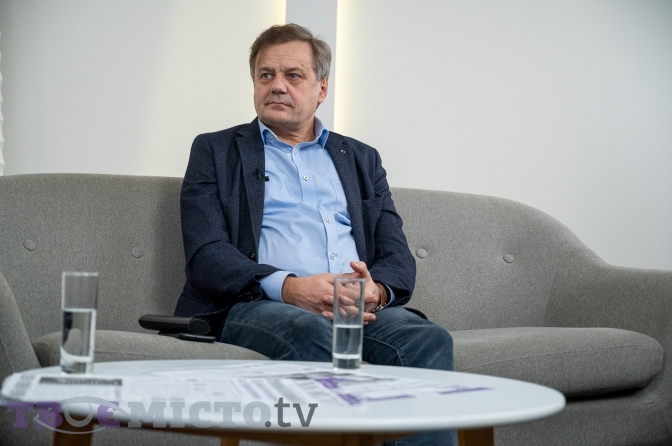
What do you think about the practice of cancellation in general? Is this not displacement in psychotherapy?
No, it is annulment, destruction. We act like this when something very threatening, or scary appears. In some extreme cases, it saves our lives, but in the long run, it’s not a very good practice.
That is, it should be talked about and understood as a trauma?
Yes, but for this we need the war to end, because until then, we cannot think rationally. When the war is over, we must find words, a position, and a platform. And for now, we have to be clear.
Andrii Saichuk spoke
Text: Marichka Ilyina, Translated by Vitalii Holich
Photo: Your city
Full or partial republication of the text without the written consent of the editors is prohibited and considered a violation of copyright.
Follow us on Facebook and Instagram. Lviv Now is an English-language website for Lviv, Ukraine’s «tech-friendly cultural hub.» It is produced by Tvoe Misto («Your City») media-hub, which also hosts regular problem-solving public forums to benefit the city and its people.


